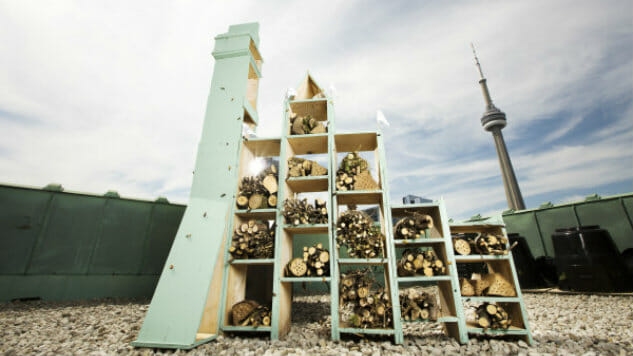
These days, it’s not surprising to see hyperlocal elements on a restaurant menu, from the lettuce in a restaurant salad that can come from the garden out back, and the rosemary-infused simple syrup at a craft cocktail bar that is house grown, house made.
In an effort to support and advocate for bees, undergoing a severe population decline in North America, a local ingredient that continues to gain popularity is honey. And it’s on a menu where you might least expect it: hotels.
Since 2008, Fairmont Hotels & Resorts has been operating its Bee Sustainable program, today responsible for beehives on the rooftops of over 20 properties around the world. The program even spawned the creation of customized Fairmont bee hotels, wooden structures designed to attract bees (you can build your own with the help of this guide). These hotels are targeted to attract wild mason bees, an important and prolific pollinator.
“Sustainability isn’t a buzz word at Fairmont, it’s a core element of our operations and an area that our colleagues and hotels soundly embrace,” says Jane Mackie, vice president, Fairmont Brand. “Through our bee programming, rooftop herb and vegetable gardens, waste and water reduction efforts, and countless other environmental initiatives, our hotels work hard to support the broader ecosystem in meaningful and impactful ways.”

At Fairmont Waterfront in Vancouver, the bees share a space with the 2,100 square foot herb garden, and even have their own “Bee Butler” who does hive tours for guests. Here, the hotel harvests about 125 pounds of honey annually. At the various Fairmont hotels with hives, the honey produced is “used by the chefs in restaurant dishes and by hotel mixologists in drinks,” says Mike Taylor, Director, Global Communications & Public Relations for Fairmont. “For example, this includes desserts, various sauces and spreads and signature cocktails. Many hotels also bottle their honey and sell it directly to guests with some proceeds going back to support local bee cooperatives.”
Fairmont isn’t alone. Around the world luxury hotels have added beehives to their rooftops, including the Waldorf Astoria in New York City and the Mandarin Oriental in Paris.
While tasty, and a compelling ingredient in both sweet and savory dishes, installing beehives it’s not just about the end honey result. “It is critical that we find ways to protect the bee community and give them a place to nest,” said Chef Todd English, creator of The Todd English Food Hall at The Plaza in New York City. “Some of my favorite ingredients such as tomatoes and eggplant only exist due to pollinator bees.”

An essential part of the food production system, bees are estimated to be responsible for an economic benefit of $326 billion. Some estimates even put the impact of pollinators (which also includes other pollinators like some species of butterflies and beetles) on agricultural income in the United States at upwards of almost $600 billion. Without them, our food supply would diminish drastically, as visualized by the University Heights Whole Foods Market who removed all the products dependent on bees and photographed a very empty display. A 2011 Natural Resources Defense Council report found that in the United States alone, over 25 percent of the bee population had disappeared since 1990. That number has continued to get worse.
The American Association for the Advancement of Science recently presented a map documenting the areas in the United States where wild bees are most at risk. Many of the danger regions are in agricultural hotbeds responsible for large portions of U.S. food production, like California’s Central Valley.

Hopefully, a combination of awareness and knowledge of bees will help us to save them before it’s too late. “The good news about bees,” said Taylor Ricketts, a conservation ecologist at the University of Vermont, in a press release, “is now that we know where to focus conservation efforts, paired with all we know about what bees need, habitat-wise, there is hope for preserving wild bees.”
Anna Brones is the author of The Culinary Cyclist and Fika: The Art of the Swedish Coffee Break, the founder of the print quarterly Comestible and runs Foodie Underground. Wherever she is in the world, she can often be found riding a bicycle in search of excellent coffee.